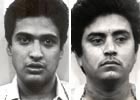Part 2 of Chicago Tribune Series on Carlos De Luna
Excerpt
THE FINAL HOURS
After years of failed appeals, De Luna lost his final bid for clemency on Dec. 6, 1989.
By then, prison guards had moved him to the holding cell just steps from the execution chamber in Huntsville. It was there that he met death-house chaplain Carroll Pickett. A Presbyterian minister, Pickett had counseled 32 other prisoners in the seven years since Texas resumed executions in 1982.
As he had with each prisoner, Pickett explained to De Luna every detail of what would take place in the coming hours: how the warden would come and say it was time to go; how there were eight steps from the holding cell to the door of the execution chamber, five more to the gurney; how guards would strap him down; and then, finally, how the warden would remove his glasses to signal for the flow of lethal chemicals to begin.
De Luna’s only question for Pickett was whether it would hurt when the needles were inserted in his arm.
Later that day, De Luna, the youngest of nine children, visited with family members–his sister Rose, her fiance, a half brother and his wife.
Shortly before 5 p.m., the U.S. Supreme Court turned down his appeal. De Luna showered and donned dark blue pants and a light blue shirt.
Increasingly anxious, he asked Pickett if he could call him daddy. “I never had a daddy,” Pickett said De Luna told him. “You are like my daddy should have been.”
About 7 p.m., after the governor denied De Luna’s clemency request, Pickett talked to him about the crime. In ministering to condemned prisoners, Pickett had learned that, in their last hours, most inmates, even those who would claim innocence in a final statement, would confide their guilt to him.
“I’m the last person they’re going to talk to,” Pickett said in an interview, “so they feel they can finally talk about it.”
De Luna told him he was innocent.
Shortly before 10 p.m., De Luna asked to make a call to a former Corpus Christi TV reporter who had covered the trial and kept in touch in the years afterward.
“We both knew there was no hope at that point,” the reporter, Karen Boudrie, said. “I asked him point-blank: Is there anything you want to get off your chest?
“He said, `I’m not the bad guy they say I am,'” she recalled. “He said, `I didn’t do it.'”
Around 11 p.m., De Luna looked at Pickett and said, “Let’s get serious.”
They grasped hands through the cell bars, and De Luna asked Pickett to pray that he would be strong in his last minutes and that he would be quickly received into heaven.
When they began, Pickett noticed, De Luna was sitting on the side of the bunk; by the end, he had dropped to his knees on the cell’s cold concrete floor.
“A little after 12, the signal came. I stepped back,” Pickett recalls in a recording he made shortly after the execution. “The doors opened. I walked into the death chamber, the death house itself. Carlos followed behind me.”
De Luna climbed onto the gurney. “As he laid down, he said, `Are you here, chaplain?’ I had assured him I would be. He asked me to hold his hand. . . . I told him he had done fine,” Pickett says on the tape. “And he said, `This is not so bad.'”
After the witnesses to the execution filed in, the warden asked: “Carlos De Luna, do you have any last words?” De Luna made no reference to the slaying of Wanda Lopez. “I want to say that I don’t hold any grudges,” he said as part of his short final statement.
At that, the warden removed his glasses.
“After about 10 seconds, [De Luna] raised up his head and looked at me with those big brown eyes,” Pickett says on the tape. “The warden looked at me, and I looked at him. He was concerned. I was concerned. Something was not going right. Because he should have been asleep.
“After about 10 seconds more, he raised his head up again. He looked square in my face and my eyes. I just simply squeezed his leg. I don’t know what he was trying to say. I wish I did.
“This bothers me and probably will forever and ever. Because nothing was happening. I had told him, I had promised him it wouldn’t hurt, it wouldn’t take long. Now we were more than 25 seconds into it, and he was still able to raise his head up and look. I was sickened.”
Pickett looked at the tube running into De Luna’s veins. He could see the bubbles indicating where each chemical ended and the next began.
More than 9 minutes passed.
“He gave a couple of exhales, and that was it.” At that, the doctors came in and declared De Luna dead. It was 12:24 a.m.
“The first injection began at 12:14,” Pickett spoke into the tape recorder later. “This was 10 minutes. Too long. Way. Too. Long.”
Partly as a result of watching De Luna’s execution, Pickett eventually became an activist against the death penalty.
“This one I wonder: What was he trying to tell me, if anything, when he raised up his head? … What did he say? What did he think?
“Whatever,” Pickett added, “Carlos De Luna did not need those extra minutes and certainly not those extra 25 seconds. That I will never forget.”












